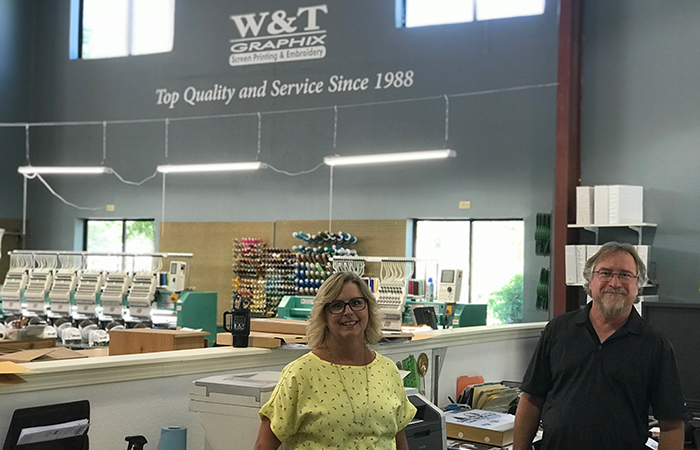
Tonya and Wes Beyer, owners of W&T Graphix in Truckee, California (Photo: Resilience Fund – Sierra)
The COVID-19 pandemic has taken a mighty toll on the small businesses of the Truckee and North Lake Tahoe region of the Sierra Nevada. A new and innovative nonprofit lending program seeks to help make them whole again.
The locally driven “Resilience Fund – Sierra” was launched to provide small business owners with the financial assistance, resources, and guidance they need to reopen and operate amid the ongoing crisis. Local investors and supporters of Truckee – North Lake Tahoe are investing in the fund to help their own communities and support economic recovery and growth.
Administered and supported by the Sierra Business Council, the Resilience Fund aggregates both donated and invested money into a revolving fund for small businesses. Eligible businesses can access the funding as low-interest micro-loans, and also receive technical and financial advisory services through the Small Business Development Center. The loans range from $5,000 to $25,000 and are used for operating capital.
The program is designed to support the many small, distinct businesses that contribute to the charm, lifestyle, and economic vibrancy of mountain towns in and around Lake Tahoe, particularly within historic downtown areas and cultural centers, said Kristin York, vice president of business innovation at the Sierra Business Council.
“This is about keeping our downtowns thriving,” York said. “For these communities, seasonal tourism is critical. But in March, everything relevant to tourism shut down.”
York explained that the Resilience Fund was designed to “create a substantial fund to help businesses recover. The fund can stay alive to help businesses grow and expand.”
On June 23, the Resilience Fund will be highlighted during “Regions Recover Together,” an interactive webinar hosted by California Forward, the California Stewardship Network, the California Economic Summit network, and state and local leaders. The webinar’s focus will be on local and regional recovery strategies aimed at addressing the COVID-19 crisis and reducing the significant racial and geographic inequities that existed before it struck.
The idea for the Resilience Fund took life when a local resident stepped up to ask how the struggling small businesses in the area could be helped. This individual contributed a sizeable investment to jumpstart the lending program, and also donated cash to get the program up and running. Other initial investors and supporters include the Town of Truckee and the Truckee Chamber of Commerce through the Truckee Tomorrow public-private partnership.
“This is creative philanthropy,” York noted. “This person didn’t want to just donate and walk away.”
The Fund serves small business owners with fewer than 25 employees within the Tahoe-Truckee Airport District who have been affected by the COVID-19 pandemic. Eligible businesses must have a “brick-and-mortar” physical presence and fixed expenses and include retailers, restaurants, providers of specialty goods and services, and other storefront operations.
The Resilience Fund’s website became operational May 1. By the end of that first month, 120 requests for assistance had come in. During that same period, the Fund raised $750,000, and provided about $450,000 in micro-loans to 20 small businesses, providing a total of 148 jobs.
The Resilience Fund is set up as a revolving loan fund. As funds are repaid, they can be re-borrowed. Investors in the fund commit to a five-year investment period, with the option to roll over funds for another five years. Investors earn two percent interest on their investments. Current investors include local residents and owners of second homes in the area, some of them business owners themselves. In addition to having about a dozen investors, the Resilience Fund also has received donations ranging from $20 to $50,000, York said.
Eligible small businesses receive the micro-loans for a term of five years, with a six-month deferral period at the front end where no interest or principal is due. They pay a two percent interest rate. The loan funds can be used for reasonable business purposes such as paying for staff, rent, capital improvements, and replenishing lost inventory.
Through the program, eligible businesses also receive financial counseling and technical assistance from the Small Business Development Center to help navigate challenges and opportunities such as negotiating rent relief with landlords, liquidating inventory, and maximizing productivity during suspended operations.
Among the first recipients of Resilience Fund assistance were Golden Rotisserie, a burrito shop in Truckee, and W&T Graphix, a screen printing and embroidery business in Truckee. More information about these two businesses and the help they received through the Resilience Fund can be found here and here.
The goal of the Resilience Fund is to raise $5 million to help improve 400 area businesses, and to deliver solutions tailored to individual business needs in a swift and efficient manner. The program is currently expanding into a second region in the South Lake Tahoe area, with further expansion under consideration. As this FAQ explains, once the current economic crisis is stabilized, the Resilience Fund is envisioned to serve as “permanent loan infrastructure for the small business community to help them grow, expand, and thrive.”
York noted that Resilience Fund – Sierra has potential for being replicated elsewhere.
“Every community should have a fund like this,” she said. “This is catalytic capital. We disperse funds quickly. I will wave the community loan fund flag my whole life. It’s so impactful.”

